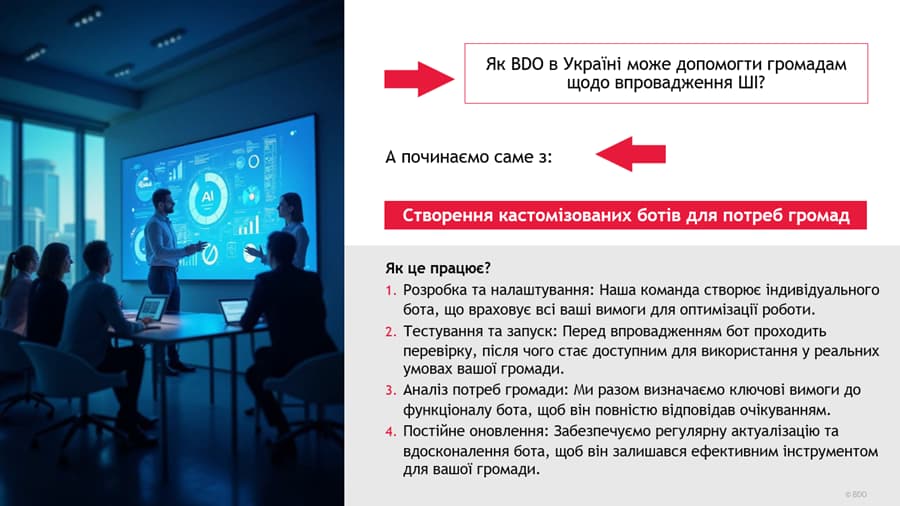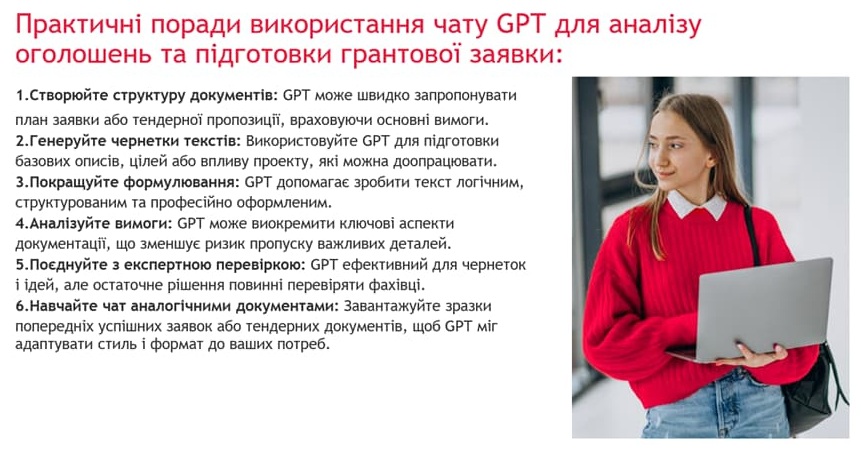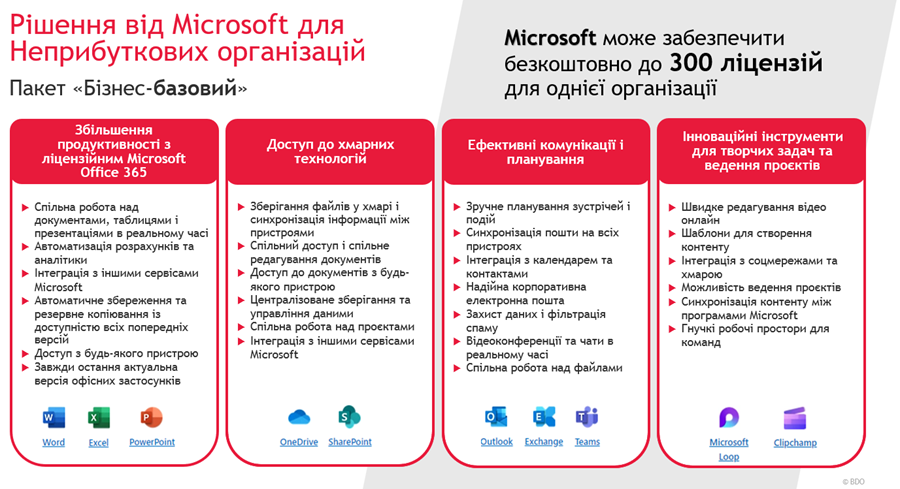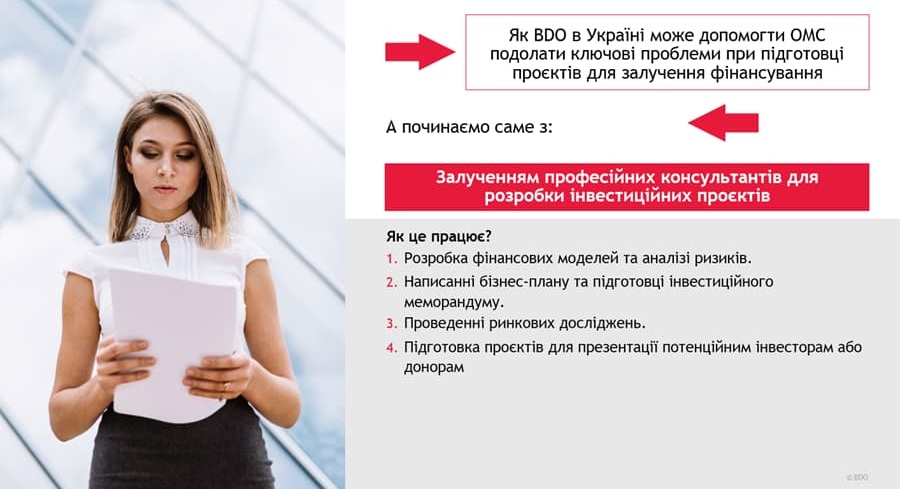On November 27, 2024, BDO in Ukraine conducted a practical webinar for local government representatives on the topic “How digital solutions and Artificial Intelligence can increase the productivity of local governments”.
The objective of the event was to disseminate practical tips and solutions that can significantly streamline the municipality operations, particularly in the field of collaboration with international partners and the deployment of digital tools. The event centered on how AI and cutting-edge technologies can optimize routine activities, enhance productivity and bolster the competitiveness of municipalities.
Tetiana Okseniuk, Chief AI Implementation Specialist, provided insights and guidance on leveraging cutting-edge translation technologies, including Artificial Intelligence. Her presentation was a pivotal contribution to the discussion on the automation and optimization of work processes in local governments with digital solutions.
Ms. Tetiana illustrated the AI’s ability to significantly streamline document processing and mitigate language barriers for local governments, particularly in the context of collaborating with international partners and preparing grant applications.
One of the most discussed questions Tetiana received during her speech related to the legal acts regulating the use of Artificial Intelligence in Ukraine. Tetiana observed that, as of today, Ukraine lacks specific legislative measures explicitly authorizing or banning the use of AI in local governments. However, there are existing regulations governing the protection of personal data.

The webinar participants received valuable insights on AI implementation from BDO in Ukraine and using various translation tools to optimize the efficiency and accuracy in their work.
During the webinar, Tetiana shared practical tips and case studies on utilizing Artificial Intelligence for agile document preparation and analysis, crucial in the grant writing process. She demonstrated how ChatGPT can significantly reduce the time required to create fact sheets and complete grant applications.

Andrii Paios, IT Director of BDO in Ukraine, provided webinar attendees with useful recommendations on implementing Microsoft infrastructure in local governments, particularly in the context of free licenses for nonprofit organizations. The presentation focused on the advantages of leveraging Microsoft technologies to improve efficiency and security.

Andrii Borenkov, Head of Advisory at BDO in Ukraine, shared his experience in preparing investment projects and provided practical advice on how to make projects attractive to international partners and investors. His presentation focused on the preparation of investment project documentation, including market research, financial models and investment attraction strategies.

Mr. Andrii highlighted the significance of developing comprehensive and realistic investment proposals to attract potential investors.
Successful cooperation with international partners requires a clear understanding of the market, technical aspects of the project and a developed financial model that shows the real potential of the project. A professional approach to project preparation and consultation with experts significantly increases the chances of success in attracting investment. Webinar participants gained useful knowledge on how to properly prepare a project and what mistakes to avoid.
The webinar discussed key aspects of implementing digital solutions and AI for local governments. Speakers shared practical advice and illustrative case studies of how modern technology can facilitate the work of local governments, particularly in preparing grant applications, automating document flow and routine tasks, and improving local government cybersecurity.
The event focused on how modern technologies and innovative approaches can significantly enhance the efficiency of local governments, strengthen their competitiveness, and facilitate collaboration with international partners and investors. All participants gained valuable insights on how to use digital tools to improve the efficiency of their organizations.
How Artificial Intelligence can simplify the work of local governments through the use of translation and automation technologies
Tetiana Okseniuk, Chief AI Implementation Specialist, provided insights and guidance on leveraging cutting-edge translation technologies, including Artificial Intelligence. Her presentation was a pivotal contribution to the discussion on the automation and optimization of work processes in local governments with digital solutions. Ms. Tetiana illustrated the AI’s ability to significantly streamline document processing and mitigate language barriers for local governments, particularly in the context of collaborating with international partners and preparing grant applications.
Key takeaways from the speech:
1. Existing AI vendors:
Tetiana discussed the major players in the AI market, including such technologies as OpenAI’s ChatGPT, Microsoft’s GPT-4, Google Gemini, and specialized solutions like Midjourney for image generation.
2. How to get started quickly with ChatGPT:
Tetiana demonstrated how to quickly register in ChatGPT and set up clear and effective queries (prompts) to obtain accurate responses. She stressed the importance of precision in formulating queries to receive the best results.
3. Customized bots for municipalities:
The presentation also addressed the development of customized chatbots which can be adapted to meet the specific requirements of the municipality in order to automate routine tasks, such as document translation or other administrative work.
4. Translating documents with AI:
Tetiana paid special attention to the translation of texts and documents with AI, showing how tools such as Microsoft Copilot and DeepL can be utilized to quickly and efficiently translate texts and PDF documents while maintaining accuracy and formatting.
Tetiana discussed the major players in the AI market, including such technologies as OpenAI’s ChatGPT, Microsoft’s GPT-4, Google Gemini, and specialized solutions like Midjourney for image generation.
2. How to get started quickly with ChatGPT:
Tetiana demonstrated how to quickly register in ChatGPT and set up clear and effective queries (prompts) to obtain accurate responses. She stressed the importance of precision in formulating queries to receive the best results.
3. Customized bots for municipalities:
The presentation also addressed the development of customized chatbots which can be adapted to meet the specific requirements of the municipality in order to automate routine tasks, such as document translation or other administrative work.
4. Translating documents with AI:
Tetiana paid special attention to the translation of texts and documents with AI, showing how tools such as Microsoft Copilot and DeepL can be utilized to quickly and efficiently translate texts and PDF documents while maintaining accuracy and formatting.
One of the most discussed questions Tetiana received during her speech related to the legal acts regulating the use of Artificial Intelligence in Ukraine. Tetiana observed that, as of today, Ukraine lacks specific legislative measures explicitly authorizing or banning the use of AI in local governments. However, there are existing regulations governing the protection of personal data.
Tetiana concluded by underscoring the importance of integrating modern AI technologies into the operations of local governments, which can extensively increase their efficiency and streamline numerous aspects of their activities. “AI presents a wealth of opportunities for municipalities, particularly in the areas of translation and automation of routine tasks. By utilizing tools such as ChatGPT, organizations can drastically reduce the time spent on document preparation while enhancing communication efficiency with international partners,” she said.

The webinar participants received valuable insights on AI implementation from BDO in Ukraine and using various translation tools to optimize the efficiency and accuracy in their work.
How to analyze and create grant proposal documentation using Artificial Intelligence
Tetiana Demchenko, Head of Local Government and Grant Support at BDO in Ukraine.During the webinar, Tetiana shared practical tips and case studies on utilizing Artificial Intelligence for agile document preparation and analysis, crucial in the grant writing process. She demonstrated how ChatGPT can significantly reduce the time required to create fact sheets and complete grant applications.
Key takeaways from the speech:
1. Creating a municipality fact sheet:
Tetiana illustrated how to create a structured municipality fact sheet utilizing ChatGPT, with the use of open-source information and existing documents. She also depicted how to properly formulate the profile to obtain up-to-date and accurate information about the municipality, including its geographic location, socioeconomic status, history, and other relevant data.
2. Completion of grant applications:
Tetiana showcased how Artificial Intelligence can automatically complete grant applications based on the input data provided. She provided examples of how to analyze the terms of grant competitions, complete application forms and even generate a project budget, implementation schedule and other essential data.
3. Analysis and preparation of grant documents:
Tetiana demonstrated how grant documents can be downloaded in PDF or Word format and analyzed the use of ChatGPT to identify key requirements and create the necessary attachments, thereby significantly reducing preparation time and allowing to focus on important aspects of the project.
4. ChatGPT features for grant documents:
Tetiana underscored the necessity of validating the AI output, as ChatGPT can offer generic responses which require additional verification by specialists. Additionally, she highlighted the role of cross-referencing with other sources to clarify details and adapt the information to the specific requirements of a given competition.
Tetiana illustrated how to create a structured municipality fact sheet utilizing ChatGPT, with the use of open-source information and existing documents. She also depicted how to properly formulate the profile to obtain up-to-date and accurate information about the municipality, including its geographic location, socioeconomic status, history, and other relevant data.
2. Completion of grant applications:
Tetiana showcased how Artificial Intelligence can automatically complete grant applications based on the input data provided. She provided examples of how to analyze the terms of grant competitions, complete application forms and even generate a project budget, implementation schedule and other essential data.
3. Analysis and preparation of grant documents:
Tetiana demonstrated how grant documents can be downloaded in PDF or Word format and analyzed the use of ChatGPT to identify key requirements and create the necessary attachments, thereby significantly reducing preparation time and allowing to focus on important aspects of the project.
4. ChatGPT features for grant documents:
Tetiana underscored the necessity of validating the AI output, as ChatGPT can offer generic responses which require additional verification by specialists. Additionally, she highlighted the role of cross-referencing with other sources to clarify details and adapt the information to the specific requirements of a given competition.

“Artificial Intelligence can greatly reduce the time required to prepare grant applications. With ChatGPT, you can not only create a municipality profile but also complete grant forms quickly, saving time for more crucial strategic tasks,” said Ms. Tetiana.
Implementing Microsoft infrastructure for local governments: Benefits, free licenses and efficiency improvements
Andrii Paios, IT Director of BDO in Ukraine, provided webinar attendees with useful recommendations on implementing Microsoft infrastructure in local governments, particularly in the context of free licenses for nonprofit organizations. The presentation focused on the advantages of leveraging Microsoft technologies to improve efficiency and security.
Key takeaways from the speech:
1. Using Microsoft infrastructure for local governments:
Andrii explained how to effectively integrate Microsoft infrastructure, including tools such as Teams, Outlook, SharePoint, OneDrive, etc. to ensure reliable communication and collaboration in local governments. He highlighted the importance of secure communication channels, particularly in the context of martial law, where minimizing the risks of cyberattacks is of paramount importance.
2. Benefits of free licenses for non-profit organizations:
Andrii focused on the opportunity to receive free licenses from Microsoft through the Charity program, which is accessible to nonprofit organizations, including local governments. This enables organizations to use premium tools for boosting productivity and security at no cost.
3. Improving cybersecurity through Microsoft:
One of the key themes of the speech was the necessity of enhancing cybersecurity measures in local governments. Andrii confirmed that the use of Microsoft enterprise solutions offers an advanced level of data protection, vital in the context of contemporary security challenges.
4. A single cloud solution for collaboration:
Andrii also discussed the advantages of a unified cloud-based platform for file storage and document collaboration. By integrating solutions such as SharePoint and OneDrive, local governments can efficiently organize document management and complete grant applications and other crucial documents, reducing the risk of errors and delays.
Andrii explained how to effectively integrate Microsoft infrastructure, including tools such as Teams, Outlook, SharePoint, OneDrive, etc. to ensure reliable communication and collaboration in local governments. He highlighted the importance of secure communication channels, particularly in the context of martial law, where minimizing the risks of cyberattacks is of paramount importance.
2. Benefits of free licenses for non-profit organizations:
Andrii focused on the opportunity to receive free licenses from Microsoft through the Charity program, which is accessible to nonprofit organizations, including local governments. This enables organizations to use premium tools for boosting productivity and security at no cost.
3. Improving cybersecurity through Microsoft:
One of the key themes of the speech was the necessity of enhancing cybersecurity measures in local governments. Andrii confirmed that the use of Microsoft enterprise solutions offers an advanced level of data protection, vital in the context of contemporary security challenges.
4. A single cloud solution for collaboration:
Andrii also discussed the advantages of a unified cloud-based platform for file storage and document collaboration. By integrating solutions such as SharePoint and OneDrive, local governments can efficiently organize document management and complete grant applications and other crucial documents, reducing the risk of errors and delays.

“Microsoft’s free licenses for non-profit organizations are a great opportunity for local governments to gain access to high-quality tools at no additional cost, which also helps to increase productivity and ensure cybersecurity,” said Andrii Paios.
How to make projects attractive to international partners and investors: Preparing documentation and financing
Andrii Borenkov, Head of Advisory at BDO in Ukraine, shared his experience in preparing investment projects and provided practical advice on how to make projects attractive to international partners and investors. His presentation focused on the preparation of investment project documentation, including market research, financial models and investment attraction strategies.
Key recommendations from the speech:
1. Key challenges in preparing investment projects:
Andrii noted several key challenges faced by organizations preparing investment projects:
Andrii stressed the importance of a comprehensive financial model that incorporates a thorough assessment of market conditions, the technical aspects of project implementation, the cost and revenue projections. He said that the project should be financially viable, taking into account realistic financing options, and that the project’s potential for profit generation or socio-economic impact should be considered.
3. Key components that investors expect to see in a project:
Andrii shared the details of what an investment project should contain to be attractive to investors:
Andrii noted several key challenges faced by organizations preparing investment projects:
- Ideas which are called projects but are not sufficiently developed.
- A lack of understanding of key investment parameters (e.g., internal rate of return).
- Errors in calculations and incorrect assumptions.
- Issues with financial models and underestimation of risks.
Andrii stressed the importance of a comprehensive financial model that incorporates a thorough assessment of market conditions, the technical aspects of project implementation, the cost and revenue projections. He said that the project should be financially viable, taking into account realistic financing options, and that the project’s potential for profit generation or socio-economic impact should be considered.
3. Key components that investors expect to see in a project:
Andrii shared the details of what an investment project should contain to be attractive to investors:
- Market research: analysis of the market, competitive environment and demand.
- Technical implementation: description of technologies, project implementation timeframe and technical aspects.
- Financial model: revenue and expense projections, development scenarios and profitability calculations.
- Project financing plan: a detailed plan for funding sources and capital structure.

Mr. Andrii highlighted the significance of developing comprehensive and realistic investment proposals to attract potential investors.
“An idea is not always a project. The idea must be well prepared and have all the characteristics of a real project so that the investor can see exactly what he is investing in,” he said.
Successful cooperation with international partners requires a clear understanding of the market, technical aspects of the project and a developed financial model that shows the real potential of the project. A professional approach to project preparation and consultation with experts significantly increases the chances of success in attracting investment. Webinar participants gained useful knowledge on how to properly prepare a project and what mistakes to avoid.
The webinar discussed key aspects of implementing digital solutions and AI for local governments. Speakers shared practical advice and illustrative case studies of how modern technology can facilitate the work of local governments, particularly in preparing grant applications, automating document flow and routine tasks, and improving local government cybersecurity.
Main conclusions:
- Digital solutions and AI can significantly increase the efficiency of local governments, helping to automate routine tasks and reduce the time spent on administrative procedures.
- Using cloud technologies like Microsoft 365 ensures a high level of security and allows local governments to work with documents online, which is especially important in the face of modern cybersecurity threats.
- Preparing investment projects requires a comprehensive approach that includes market research, technical implementation, financial calculations, and clear planning. It is important to have a realistic financial model that demonstrates the project's profitability and potential to attract investors.
- The process of preparing grant applications can be facilitated, made more accurate, and less time-consuming through the use of AI and digital tools.
The event focused on how modern technologies and innovative approaches can significantly enhance the efficiency of local governments, strengthen their competitiveness, and facilitate collaboration with international partners and investors. All participants gained valuable insights on how to use digital tools to improve the efficiency of their organizations.
